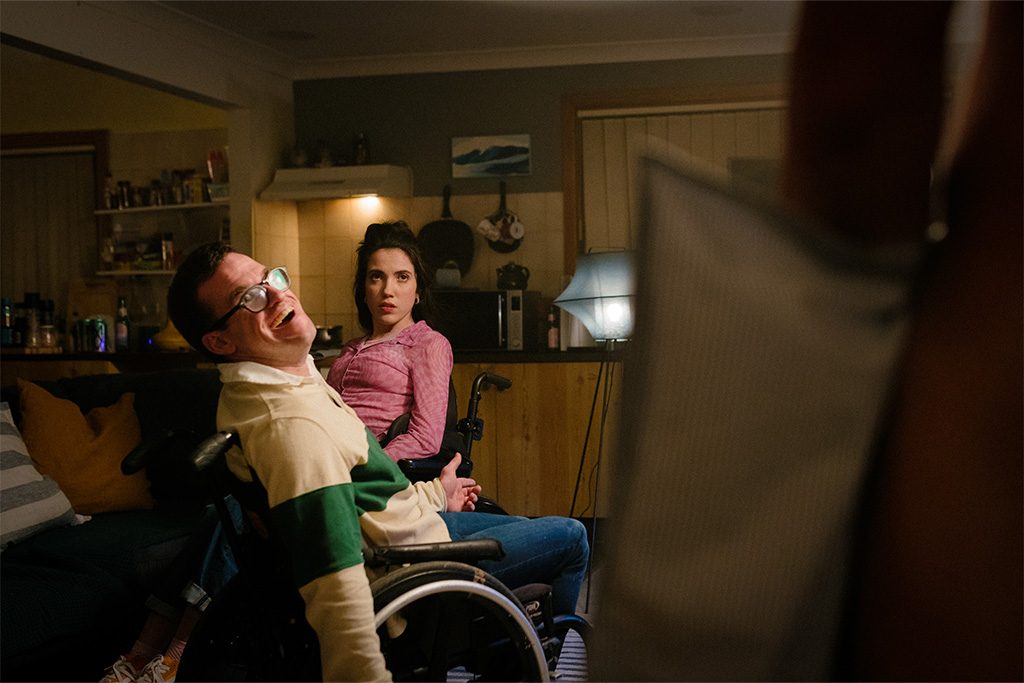How Hannah Diviney Became The First Disabled Woman On Australian TV To Have Sex
When it comes to sex and relationships, it’s better late than never.
Add the intricacies of disabilities and you have the news series Latecomers which is a first of its kind.
“We’ve never had a show like this on Australian television. We’ve never seen disability represented this way,” writer and disability advocate Hannah Diviney told Junkee.
“I think it’s going to shock a few people. It might even make a few people uncomfortable, but hopefully it’s gonna start a hell of a lot of conversations and make disabled representation much more regular instead of quite so rare.”
Introducing Latecomers
Following the lives of two strangers with cerebral palsy who end up being in each other’s orbit after their carers hook up at a bar, Latecomers is funny, real and raw in its representation of sex and disabilities.

Renata Dominik
Hannah Diviney is one of the show’s lead roles.
Filming Latecomers was a “happy accident” and “probably the best experience” of Hannah’s life.
“It challenged me, it made me laugh, it made me cry.”
Outside of acting, Hannah is busy being an advocate for disability and women’s rights. Earlier this year, Diviney called out the biggest names in the music industry to address their ableist lyrics.
Growing up, Hannah never really saw herself reflected in the media. The first time she saw a disabled character was when she was 10 watching Artie Abrams from Glee.
“I remember being so excited because he was this guy who sang and danced, which I love to do. He had friends, which is all I wanted back then. He was in relationships, he was doing all of these cool things,” she said.
That was until, the character of Artie has a dream sequence where he starts to stand up and dance like an able-bodied person.
“It challenged me, it made me laugh, it made me cry.”
“Watching that was like a punch in the gut because I remember thinking, oh wait, so this person doesn’t actually know what it’s like to be disabled. They’re just wearing my life like a costume they can cast off as soon as the director yells cut.”
There is actually a phenomenon popularised by the disabled community on Twitter called “cripping up”.
It’s when someone plays a disabled role which fast tracks themselves for awards success because of the level of emotional, physical and psychological transformation that a role takes.
For reference, for the 93 years of Academy Awards, there have been 61 nominations for actors portraying disabled characters.
27 of these nominees won the Oscar — only two out of the 27 actors being disabled.
We’ve been speaking out about cripping up for so long. It’s not okay. Not in the slightest. Autism isn’t a costume. Disability is not a costume. If you really want an accurate depiction of disabled people, you MUST hire an actor with that disability. Not an option.
— Elizabeth M. (@hypo_awareness) November 20, 2020
“Obviously there are cases where hiring a disabled actor isn’t going to work, especially if you are telling a story where someone comes into their disability like midway through the film or something. You definitely need like an able-bodied actor in that case,” she explained.
Even then, Hannah is still a huge proponent of representation and of disabled stories being told by disabled people “in front of the camera and behind it” and really “every step of the creative process”.
The beauty of Latecomers is that it’s written by people with cerebral palsy and is about them too. Oh and the sex scenes are history in the making.
View this post on Instagram
“I was very insistent that we didn’t just insinuate what was happening, that we showed it and we showed it in multiple ways from kind of start to finish, if you will,” Hannah said.
Reflecting on the moment when her and the cast realised the gravity of the sex scene they had just shot, Hannah said, “we all burst into tears”.
“Everybody was like, oh my God, we just made television history. This is going to mean so much to people because obviously disability and sex are not really things that go together in people’s minds,” she said.
Moving forward, Hannah would like all Australian media to making sure disabled representation is on the agenda.
“I just want people to feel seen and I want people to know that relationships and sex and all of those things are a possibility for them. That they don’t have to be afraid that there’s nothing wrong with them wanting that.”
You can watch Latecomers on SBS On Demand from Saturday 3 December.


